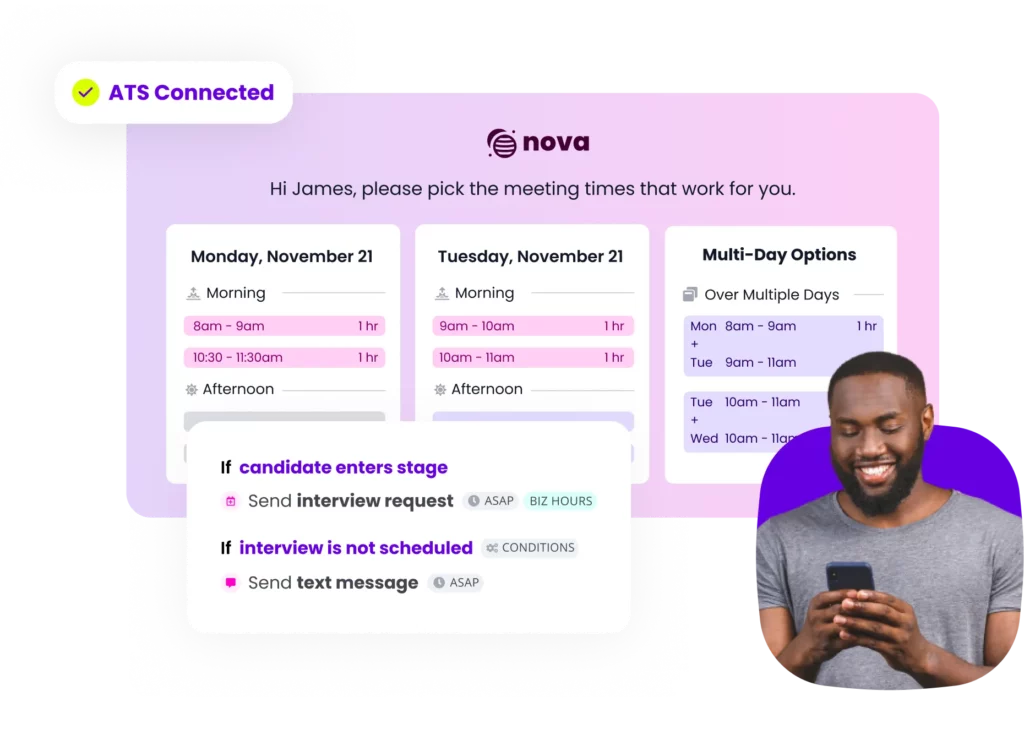Table of Contents
Do you ever wonder what’s going on inside a candidate’s head? You should. In today’s hiring landscape, it’s crucial for your recruiting team to put themselves in your candidates’ shoes.
We’re still in the thick of a candidate’s market; there are two jobs for every available worker. With candidate’s having the upper hand, the smartest talent teams try to channel a candidate’s perspective when evaluating their hiring process.
Your candidates might start each interview with a beaming smile, but behind that smile, candidates are carefully examining your hiring methods, forming their own brutally honest thoughts on your team and organization.
Here are five things candidates wish they could say to your recruiting team.
1. “My time is precious. Please respect it.”
Don’t expect candidates to move their schedules around to accommodate your interviewers’ calendars. It’s a candidate’s market, remember? Candidates want to schedule interviews at times that best fit their calendar. Ask for their availability upfront.
And don’t even get us started on scheduling all-day interviews. The expectation in the past might’ve been that candidates should block out their full day to speak with your company’s employees, but the past is the past. Now, candidates would much rather interview in chunks across several days.
Above all, remember: your candidates are most definitely interviewing for roles at other companies. They’re more likely to remember and appreciate your interview process if you schedule their interviews with flexibility and understanding.
AI for more human hiring
Interview scheduling is just the start. Use human-centric AI to elevate your hiring experience while automating 90% of interview scheduling tasks — for any role, in any place, at any scale.

2. “Salary and benefits: be honest upfront.”
Transparency is top of mind for candidates. The Pay Transparency Pulse Report shows that 79% of employees want some form of pay transparency, and 32% want full transparency. To add to that, 68% of respondents said they would switch employers for greater pay transparency, even if compensation was the same.
It’s common for companies to try to get leverage by waiting until the last moment to disclose the position’s true salary and employee benefits. This is a practice that recruiting teams need to leave behind.
Displaying transparency not only makes a workplace more appealing to candidates, but is also holistically practical from a recruitment perspective. Waiting until the last minute to learn that a candidate’s expectations don’t match up with a role wastes everyone’s time. Smart hiring teams are transparent from the get-go.
3. “What do you really mean by ‘work-life balance’?”
“A great work-life balance” is a phrase that companies love to throw into the “perks” section of job posts. But what do they really mean when they say work-life balance? That’s a question that an increasing number of candidates have for hiring teams.
Does offering a great work-life balance mean that a company allows employees to set their own hours? Does it mean that the position is remote or hybrid? Job seekers care about the specifics. Candidates ranked work-life balance as more important than compensation, culture, and benefits.
Interviewers should clearly describe how their company provides employees with the flexibility that creates a healthy work-life balance. In doing so, interviewers will open the door for a greater diversity of candidates, such as working parents, who cannot compromise on a lack of a work-life balance.
4. “Your company celebrates DE&I? These interviews don’t show it.”
Candidates from underrepresented groups want to be interviewed by a diverse array of interviewers with whom they share similar traits. Seeing employees that are similar to them makes candidates feel represented by their potential employer. Candidates will notice if a panel lacks diversity—trust us.
Besides creating diverse interview panels, another way that your recruiting team can uplift DE&I is by having all interviewers undergo bias training. Everyone relies on unconscious bias from time to time. But with the proper interviewer training, it’s entirely possible to reduce bias and create an objective interview process.
All in all, conveying a commitment to DE&I in hiring not only attracts candidates, but also benefits your bottom line. Diverse teams produce 19% higher revenue. Focusing on DE&I just makes sense.
5. “I’m not just a job candidate—I’m human, too.”
Candidates don’t want to be viewed as just a number. They want to be seen for who they really are: a human above all else. Within this, candidates want to feel a genuine, personal connection to your recruiting team.
Take time to nurture your relationships with candidates. Here’s an insight to jump off of: 62% of employees say that well-being support is their top priority in the job hunt. Offering yourself as a resource if candidates have any concerns is a great way to show that you care about their well-being, and improve your relationship with them.
Make the connection between you and your candidates as mutual as possible. Find out what candidates want in a role—not just what they can offer your organization. After all, you want new hires to feel engaged in their jobs.
Supercharge Your Recruitment Process Today
Now that you’ve gotten a glimpse into what candidates wish they could say to you, it’s time to put these insights into action and level up your recruitment process.
If you want to stand out among other companies, you need recruitment tech that truly prioritizes candidates. Look no further than GoodTime Hire.
GoodTime Hire harnesses Candidate Relationship Intelligence to automate coordination, build relationships during interviews, and provide actionable insights to continuously improve your hiring process.
If you want to take your recruitment process to the next level, learn more about Hire today.





